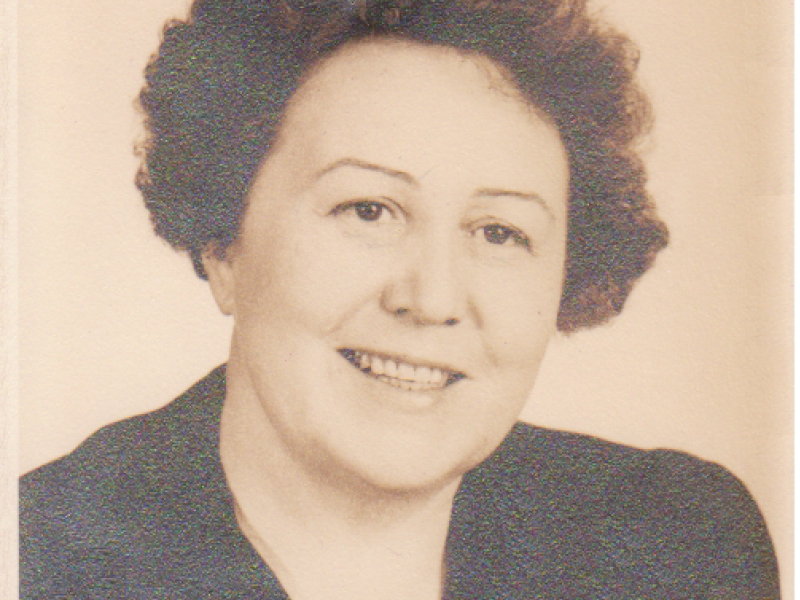Lexie Dean Robertson was a teacher and poet. She was born in Lindale, Texas, on July 25, 1893, the daughter of Alexander Green and Lena (Ansley) Dean. Her parents were both teachers.
She grew up in Canton and married J. F. Robertson on August 16, 1911, while both were students at North Texas State Normal College (now the University of North Texas).
The Robertsons taught in Texas and Oklahoma for the remainder of the decade, and Lexie took additional courses at the universities of Oklahoma and Chicago.
In 1920 they settled in Rising Star in Eastland County, Texas, where Lexie spent five years as a school principal.
She earned a B.A. degree from Howard Payne College in 1925 and left teaching to devote herself to full-time writing.
Her poems appeared in various newspapers, anthologies, and magazines, including Kaleidograph, Southwest Review, Holland’s Magazine, Country Gentleman, Good Housekeeping, and Ladies’ Home Journal.
Much of her poetry was of the “homespun” type, and many of her early poems were concerned with the effect of the oil industry on West Texas communities.
Her first collection, Red Heels, went through ten editions, and I Keep a Rainbow won the 1932 book award of the Poetry Society of Texas. Lexie was poet laureate of Texas from 1939 to 1941, the first native-born Texan to hold the title. She was a member of the Poetry Society of America, a charter member of the Texas Institute of Letters, and president of the institute in 1944. She was also an active clubwoman and poet laureate of the Texas Federation of Women’s Clubs. She served as vice president of the Poetry Society of Texas, and during her writing career she won every prize the society offered.
After her death the society established the Lexie Dean Robertson Award in her honor. Robertson published four volumes of verse: Red Heels (1928), I Keep a Rainbow (1932), Acorn on the Roof (1939), and Answer in the Night (1948). She died in Abilene on February 16, 1954, and was buried in Rising Star.
Source: Texas State Historical Association
Absent
I am weary of being surrounded by things:
Books in their neat rows,
Magazines scattered about,
Even my kitchen with its shelves of cheerful yellow bowls
Does not stir me.
I wander about my little house
Like the wraith of a happy yesterday
Hunting lost joys.
I have no right to miss you so … in my little house.
But once you sat with me before my fireside,
And now the flames blaze at my heart,
Mocking me with the emptiness of my house.
Serenade
There is a singing in my heart
Like whispering of waves
That echo tunes where mermaids sing
Deep in their turquoise caves.
A singing like far temple bells
Swung in a golden arc
To build a bridge of melody
From saffron dusk to dark.
Like shining splash of purple oars
In some smooth moon-drenched pool
Where willows dip their scented fronds,
And little winds blow cool.
A singing sweet as any sound
That beauty ever heard,
And this is strange … because your name
Is my song’s only word.
A Chant of my Beloved
My beloved
Is the altar
Upon which is lit the incense
Of a woman’s dreams.
My beloved is darkly beautiful.
The shadow of his profile
Is as an effigy upon a Grecian vase,
A curving tender smile to pierce the soul.
My beloved
Has the quick grace of a stag in flight.
The slim pines of the forest
Bend not more easily
to the south wind’s swift caress
Than my beloved sways
in mazy rhythms of the dance.
The voice of my beloved
Is as the music of a thousand muted lutes
Whispering through primrose twilight.
The kiss of my beloved
Is as warm honey on the mouth.
The eyes of my beloved
Are as a violet flame, searingly beautiful.
The arms of my beloved
Are as the purple hills where cedars stand
Fragrant and indomitable through centuries.
The love of my beloved
Is all a woman asks
Of earth or heaven.
A Romany Lad Passed By
I know a gypsy boy
With dreams in his eyes,
And tears in his laughter,
For life’s made him wise.
He carries quaint charms
In his pack to sell,
Good for the casting
Of any dark spell.
One is for harvests,
And one is for gold,
And one is for warm hearths
When you are old.
I bought a charm once
With no coin to pay,
But I’ve been a daft girl
Since that day.
Once was a brown boy
Taught me to sing,
Took of my kisses
But gave me no ring.
My song was a gay lilt,
Silver as the moon,
But now I can only croak
A harsh dark tune.
There is a gypsy lad
Who flings coins away.
Gold, he says, is heavy
To carry at play.
I was his partner once
To dance and to sing,
But I stopped to gather up
The coins he would fling.
Gold is a heavy load
Just as he said,
But now I must carry it
Till I am dead.
Gossip
Before I knew how cruel
Just common talk can be,
I thought that words were singing things
With colors like the sea.
But since I’ve felt their caustic lash
And know how they can sting,
I hold my breath when words go by
For fear they will not sing.
Aunt Gilly
Aunt Gilly was a Texas belle
When she was fair and twenty,
The cowboys for a hundred miles
Came courting her a-plenty.
Her father said he couldn’t stir,
For leather boot and silver spur.
At Texas dances long ago
Folk thought her conduct shocking,
When she swirled ruffled petticoats
And showed a silken stocking.
But Gilly swirled again with laughter,
And kicked a toe at the dusty rafter.
Her father was a sober man,
Her mother was a prude,
They barred their hearts when she left home
And married some strange dude.
But he owned a smile and a red guitar,
And the road he offered led sweet and far.
Aunt Gilly lost her smiling man
In a gambling house affray,
When he was second at the draw
In a San Antone cafe.
A screech owl warned of the news before
They laid him dead at her kitchen door.
She’ll need a tidy sum, they said,
To keep her from the cold,
So they passed around a gallon hat
And filled it full of gold.
In thanking them her lips were brave,
Gold could not pay for that new grave.
She bought herself a cattle ranch,
Just off the Chisholm Trail,
And settled down to raising steers
As well as any male.
She rode the range in skirts, of course,
But she was a demon on a horse.
My great aunt Gilly lived alone
For threescore years and seven,
The preacher at her funeral
Said she went to heaven.
But my Aunt Gilly rides a star
With a mustached dude and a new guitar.
An Answer
Why should I make shoddy verse,
When Autumn prints,
for all the world to read,
Poems like these?
A swaggering line of sumacs
Flaunting scarlet
Against the dusky curve of distant hills.
A pearl grey twilight
Lustrous with amethyst and sapphire
Before a radiant dark.
That hushed and opal hour at the dawn
When all the little grasses
hold their breath
To hear the silver whisper of the frost.


